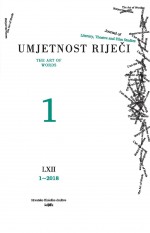MIGRATION, GLOBALIZATION, AND DIVIDED IDENTITY IN KIRAN DESAI’S THE INHERITANCE OF LOSS
MIGRATION, GLOBALIZATION, AND DIVIDED IDENTITY IN KIRAN DESAI’S THE
INHERITANCE OF LOSS
Author(s): Ksenija M. KondaliSubject(s): Other Language Literature, Migration Studies, Theory of Literature, Globalization
Published by: Hrvatsko filološko društvo
Keywords: postcolonial writing; Indian diaspora; Kiran Desai; The Inheritance of Loss; colonialism; global mobility; identity;
Summary/Abstract: In this time of ever-accelerating migration and cultural globalization, the production of Anglophone literature and the field of literary studies reflect the profound influence of these processes. Among the group of transnational and multicultural authors who write literary texts that address these processes is Kiran Desai, whose personal background and literary output exemplify the growing presence and importance of transnational writing. Drawing on the studies of Vijay Mishra and Paul Jay about diaspora and globalization, this paper discusses Kiran Desai’s novel The Inheritance of Loss (2006) in light of the colonial legacy of displacement and the resultant divided identity. Through an examination of the novel’s main themes centered on the impact of the U.S. capitalist empire and English colonization in India, this analysis explores the fragmentation of values and the crisis of individual and collective identity in an ever-changing, globalizing world. Spanning continents, and switching back and forth in time and viewpoints, Desai’s narrative reveals the ambivalence of the characters’ adjustment to the inexorable economic and social demands that leave them trapped between tradition and transition, colonialism and nationalism, diaspora and cosmopolitanism. This paper argues that the complex interplay of local custom, migration, postcolonial conflicts and diasporic existence both bring together and separate seemingly disparate worlds and characters. It also investigates how tensions between the colonial hegemony of the past, family aspirations, and community expectations affect the characters who are suspended between assimilation and resistance in the struggle to assert their personal and national identities.
Journal: Umjetnost riječi
- Issue Year: 2018
- Issue No: 1
- Page Range: 101-116
- Page Count: 16
- Language: English

